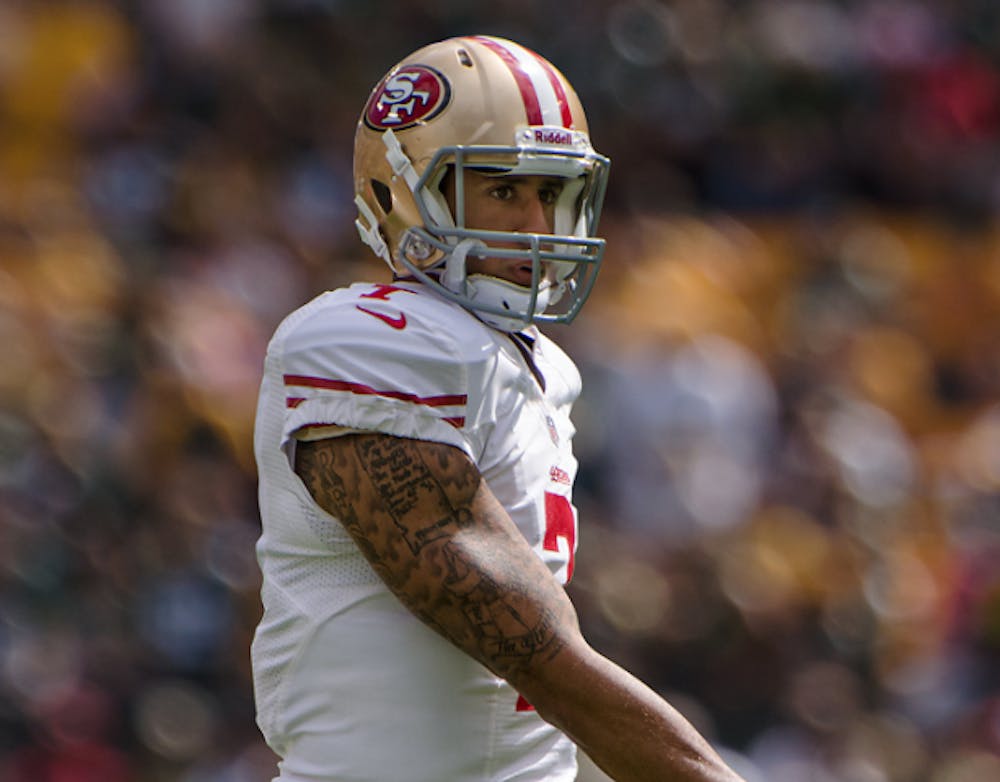Last week, the sports section of The News-Letter published an article criticizing San Francisco 49ers quarterback Colin Kaepernick’s decision to kneel during the national anthem in a protest against the oppression of black Americans. Although I vehemently disagree with the article and applaud Kaepernick’s bravery to bring issues of white supremacy into discussion, the article did provoke thought about nationalistic imagery. Specifically, how myself (a twenty-year old) and the young-adult authors of anti-Kaepernick pieces, could grow up with the same nationalistic symbols in the fervently patriotic post-9/11 world, yet develop such different viewpoints.
Every morning in grade school, I, and I’m sure many of my peers, placed a hand upon my heart, faced an American flag, and pledged my allegiance to the United States of America. Every basketball and softball game I played would start out with the same patriotic ritual: “please stand and face the flag for the playing of our national anthem.” I pledged and recited and stood and hummed along, uncritical of the ceremony.
I remember being a child and hearing about the push to change “french fries” to “freedom fries” when the French government did not support the invasion of Iraq. I remember being in middle school and chanting “USA! USA!” when Obama won the 2008 election. I remember being in high school and hearing people cheer about the killing of Osama Bin Laden. Our generation grew up learning that America was the best, no questions asked, one nation, indivisible, all wrapped up with a shiny red-white-and-blue bow.
My political opinions have evolved considerably since I was in grade school staring up at the flag (and I hope they never stop evolving). I agree with Kaepernick when he says that the American flag represents “a country that oppresses black people and people of color.” I no longer think of freedom fries. I no longer hope nor change when I view the flag, but rather see the symbol of a white supremacist settler-colonial nation founded upon genocide and slavery; a nation where a football player kneeling for the national anthem garners more outrage from white football fans than the fact there is a football team named after a racial slur.
I implore my fellow young adults to question the patriotism we were served as children. I don’t think I ever asked “why I am pledging allegiance to this flag?”--I just did because I was supposed to. I never questioned why I was taught and why I believed that the United States was the best country in the world. I didn’t learn until this month that the national anthem--ubiquitous at American sporting events-- was written by a slave owner and mentions slavery in the third verse. I know that everyone will not reach the same political conclusions I have, yet I hope that my generation at least starts questioning what we were taught.
The main argument against Kaepernick’s protest, as in The News-Letter article, is that Kaepernick’s protest, as well as general anti-American sentiment, is disrespectful to American soldiers and those who have served in the military. I frankly find this argument to be ridiculous and, ironically, disrespectful to those in the military who support Kaepernick.
Firstly, critiquing an institution does not mean disrespecting every single person involved with the institution. I personally abhor the American military institution, but that doesn’t mean I don’t love and respect my friends and family who have served. I have never made my opinions a secret, and while I’m sure some of them disagree, we still have respectful, loving relationships.
Secondly, many veterans support Kaepernick. The twitter hashtag “VeteransforKaepernick” showed current and former military personnel expressing support for Kaepernick, with some supporting the general ideas of free speech and protest and others showing support for the anti-police brutality and anti-racism aspects of Kaepernick’s protest. Veterans are not a monolith and cannot unitarily be “disrespected” by political opinions.
I have been slowly reflecting on a conversation I had on the phone with my grandfather over the summer. We were discussing the presidential election and political issues and my grandfather, a World War II veteran, remarked “I hope your generation finds a way to end war.” I don’t know if ending war will ever be possible, and I don’t think my generation is special or different than any other. But if we ever hope to improve the world just a tiny bit we have to start questioning what we were taught.
Based on his decision to fight against white supremacy - a decision he knew would invite a mountain of criticism - Colin Kaepernick has become someone I look up to even though I stood for the national anthem and pledged allegiance to the flag for years. I urge members of my generation to reflect on our upbringing in a fervently patriotic America as we do ourselves a disservice by unquestioningly spitting out nationalism.
Emeline Armitage is a junior International Studies major from Cleveland.

















